
JOURNAL OF PSYCHOLINGUISTIC RESEARCH
Scope & Guideline
Connecting Language and Thought Through Rigorous Inquiry
Introduction
Aims and Scopes
- Language Processing and Cognitive Mechanisms:
Research exploring how individuals process language, including studies on lexical access, sentence comprehension, and the role of working memory in language tasks. - Bilingualism and Multilingualism:
Investigations into the cognitive and linguistic effects of bilingualism, including studies on code-switching, language transfer, and the neural correlates of bilingual language processing. - Language Acquisition and Development:
Studies focusing on first and second language acquisition, examining the developmental milestones and cognitive processes involved in learning languages. - Psycholinguistic Applications in Education:
Research on the implications of psycholinguistic theories for language teaching and learning, including interventions designed to improve language proficiency and metacognitive awareness. - Emotional and Social Aspects of Language Use:
Exploration of how emotions and social contexts influence language processing, understanding, and usage, including the study of pragmatic skills in various populations. - Cross-Linguistic Studies:
Comparative analyses of linguistic phenomena across different languages, aimed at understanding universal versus language-specific cognitive processes.
Trending and Emerging
- Cognitive Neuroscience of Language:
An increasing number of studies are utilizing neuroimaging and electrophysiological methods to explore the neural correlates of language processing, indicating a trend towards integrating cognitive neuroscience with psycholinguistics. - Technology in Language Learning:
Research focusing on the impact of digital tools and artificial intelligence in language acquisition and teaching methodologies has gained traction, reflecting the growing influence of technology in educational settings. - Emotional and Social Influences on Language:
There is a rising interest in understanding how emotional states and social contexts affect language processing and use, highlighting the importance of affective factors in psycholinguistic research. - Intercultural Communication:
Studies examining the effects of cultural contexts on language use and comprehension are becoming more prevalent, signaling a shift towards understanding language within globalized and multicultural frameworks. - Metacognition and Language Learning:
Research exploring the role of metacognitive strategies in language learning and teaching is emerging as a vital area, emphasizing the importance of learner awareness in language acquisition processes.
Declining or Waning
- Negation Processing:
Research on negation, which was once a prominent theme, has seen fewer studies in recent issues, indicating a potential waning interest or saturation of findings in this area. - Language and Gender Studies:
Although gender-related language studies have been a focus in the past, recent titles suggest a diminishing emphasis on this theme, possibly due to the emergence of broader sociolinguistic topics. - Traditional Psycholinguistic Frameworks:
There appears to be a decline in studies strictly adhering to traditional psycholinguistic frameworks, as researchers increasingly adopt interdisciplinary approaches that integrate cognitive science, neuroscience, and technology.
Similar Journals
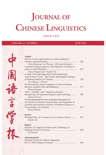
JOURNAL OF CHINESE LINGUISTICS
Illuminating the Structures and Contexts of the Chinese LanguageJOURNAL OF CHINESE LINGUISTICS, published by the JOURNAL CHINESE LINGUISTICS, is a prominent periodical that serves as a vital resource for researchers and scholars in the fields of linguistics and Chinese studies. With its ISSN 0091-3723, this journal has been contributing to the academic community since 1996 and continues to publish innovative research until 2024. Although it is classified in the third quartile (Q3) for both Arts and Humanities and Linguistics categories, its focus on Chinese linguistics positions it uniquely within this specialized domain. The journal is committed to advancing the understanding of Chinese language structures, usage, and context, encouraging interdisciplinary dialogue among linguists and language researchers. While currently not labeled as open access, the journal remains accessible to institutions and scholars worldwide, creating an invaluable platform for disseminating knowledge. As such, it plays a critical role in promoting linguistic diversity and cultural awareness within the academic landscape.
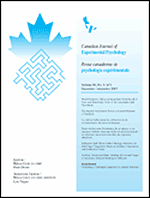
CANADIAN JOURNAL OF EXPERIMENTAL PSYCHOLOGY-REVUE CANADIENNE DE PSYCHOLOGIE EXPERIMENTALE
Innovative Insights into Cognitive ProcessesCanadian Journal of Experimental Psychology / Revue canadienne de psychologie expérimentale (ISSN 1196-1961, E-ISSN 1878-7290), published by the Canadian Psychological Association, serves as a vital resource in the fields of Experimental and Cognitive Psychology and general psychological research. With a respectable impact factor that places it in the Q3 category for both Experimental Psychology and miscellaneous Medicine (2023), this journal offers a platform for innovative research that furthers our understanding of psychological processes. Spanning years from 1993 to 2024, it connects researchers, professionals, and students to contemporary findings and methodologies, fostering a collaborative environment for the advancement of psychological science. Though it does not currently offer Open Access, the journal's commitment to quality and relevance in psychological research continues to make it an important part of the academic landscape, supporting the dissemination of knowledge within a global community.

Acta Linguistica Academica
Pioneering Open Access Research in LinguisticsActa Linguistica Academica is a distinguished academic journal published by Akademiai Kiado ZRT, located in Hungary. Since its inception in 2017, the journal has occupied a premier position in its field, achieving Q1 rankings in both Cultural Studies and Linguistics and Language, as well as in Literature and Literary Theory in 2023. With an impressive Scopus ranking placing it in the top percentiles across various categories, Acta Linguistica Academica stands out as a vital resource for researchers, professionals, and students dedicated to exploring the nuances of language, literature, and cultural dynamics. The journal provides a platform for high-quality research and diverse perspectives, facilitating the dissemination of innovative ideas and comprehensive analyses in these disciplines. As an esteemed open-access journal, it ensures that cutting-edge research is readily available to the academic community and the public at large, affirming its commitment to accessibility and knowledge sharing.
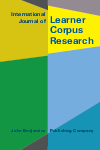
International Journal of Learner Corpus Research
Exploring the Intersection of Linguistics and EducationThe International Journal of Learner Corpus Research (ISSN: 2215-1478, E-ISSN: 2215-1486), published by JOHN BENJAMINS PUBLISHING CO, stands at the forefront of research in the fields of education and linguistics, with a notable impact demonstrated by its Category Quartile rankings of Q2 in Education and Q1 in Linguistics and Language for 2023. This distinguished journal, based in the Netherlands, presents cutting-edge studies that focus on learner corpus research—an area that merges linguistic analysis with practical applications in language learning and teaching. Spanning an impressive convergence period from 2015 to 2024, it has established itself as a vital resource for researchers, educators, and students eager to explore the nuances of language acquisition through empirical data. Notably, its high Scopus rankings underscore its significance within the academic community, making it a must-read for those dedicated to advancing the understanding of learner language dynamics.

Lingue e Linguaggio
Cultivating a Rich Discourse in Language and LinguisticsLingue e Linguaggio, published by SOC ED IL MULINO, is a distinguished academic journal in the field of Linguistics and Language, hailing from Bologna, Italy. With an esteemed Q2 ranking in its category as of 2023, this journal is recognized for its contributions to both the arts and humanities as well as social sciences, achieving notable positions within Scopus rankings. It serves as a vital platform for researchers, practitioners, and students interested in exploring various linguistic phenomena, language dynamics, and theoretical frameworks. Although it operates under a traditional subscription model rather than open access, its comprehensive array of studies and publications provides significant insights and fosters academic discourse. With a publication period extending from 2002 to 2024, Lingue e Linguaggio continues to be a key resource for advancing the understanding of language in contemporary contexts.
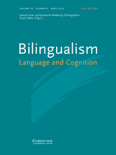
Bilingualism-Language and Cognition
Unlocking the Cognitive Dimensions of BilingualismBilingualism-Language and Cognition, published by Cambridge University Press, is a leading journal in the fields of Education and Linguistics, renowned for its rigorous academic contributions and influential research. With an impressive impact factor placing it in the Q1 quartile of both fields, this journal ranks among the top-tier publications globally, reflecting its commitment to advancing the understanding of bilingualism and its cognitive implications. Since its inception in 2005, Bilingualism-Language and Cognition has garnered significant attention, evidenced by its remarkable Scopus rankings—11th in Language and Linguistics and 12th in Social Sciences. Dedicated to publishing high-quality original research, reviews, and integrative studies, the journal aims to foster interdisciplinary dialogue among researchers, educators, and practitioners. Although not currently an open access journal, it remains a vital resource for those engaged in bilingualism research and its cognitive dimensions, contributing to the academic landscape from its home in Cambridge, United Kingdom.
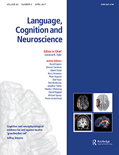
Language Cognition and Neuroscience
Unraveling the Mind: Where Language Meets Brain ScienceLanguage Cognition and Neuroscience is a premier peer-reviewed journal published by ROUTLEDGE JOURNALS, TAYLOR & FRANCIS LTD, focusing on the intersection of linguistics, cognitive psychology, and neuroscience. Since its inception in 2013, this journal has established itself as a vital resource for researchers and scholars, contributing significantly to the understanding of how language is processed and represented in the brain. With its impressive rankings in various categories—Q1 in Linguistics and Language, Q2 in Cognitive Neuroscience, and Experimental and Cognitive Psychology—it caters to a diverse and interdisciplinary audience. The journal is accessible to readers worldwide, effectively communicating cutting-edge research and innovative methodologies in the field. Open Access options enable broader disseminations of knowledge, ensuring that significant findings reach both academic and practical applications. With a commitment to high-quality research, Language Cognition and Neuroscience continues to be an influential platform for advancing theories and practices within cognitive science and language studies.
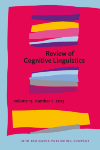
Review of Cognitive Linguistics
Bridging Linguistics and Psychology for a Deeper UnderstandingThe Review of Cognitive Linguistics, published by John Benjamins Publishing Co, is a premier academic journal dedicated to the exploration of cognitive approaches to linguistics. With an ISSN of 1877-9751 and E-ISSN 1877-976X, this journal provides a critical platform for researchers and professionals to disseminate their findings in the rapidly evolving fields of linguistics and language, alongside developmental and educational psychology. Hailing from the Netherlands, the journal boasts impressive standing within the academic community, as indicated by its 2023 Q1 ranking in Linguistics and Language and Q3 in Developmental and Educational Psychology. Additionally, its Scopus rankings reflect a strong position within the arts and humanities and social sciences categories. While currently operating under a traditional access model, this journal actively contributes to the overarching discourse within cognitive linguistics, and is a vital resource for those aiming to deepen their understanding of the intricate link between language and cognition. Researchers, educators, and students are encouraged to engage with the rich body of articles spanning its convergence years from 2010 to 2024, making it an essential read for those at the forefront of these interdisciplinary studies.
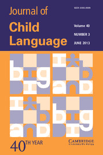
JOURNAL OF CHILD LANGUAGE
Fostering Understanding of Cognitive Growth Through LanguageJOURNAL OF CHILD LANGUAGE, published by Cambridge University Press, is a premier scholarly journal dedicated to the exploration and examination of language development in children. Since its inception in 1974, the journal has become an authoritative source in the fields of Developmental and Educational Psychology, Experimental and Cognitive Psychology, and Linguistics, boasting significant impact as evidenced by its ranking in the top quartiles across these domains. With an impressive impact factor and a commitment to advancing research, the journal serves as a vital platform for researchers, educators, and practitioners interested in the intricacies of language acquisition and cognitive development in children. The 2023 Category Quartiles place it in Q1 for Linguistics and Language, further establishing its excellence. Fostering a rich intellectual community, the journal invites contributions that advance our understanding of child language, promising a broad readership in both the social sciences and humanities.
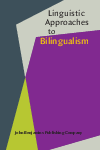
Linguistic Approaches to Bilingualism
Advancing Understanding in Linguistic DiversityLinguistic Approaches to Bilingualism, published by John Benjamins Publishing Co, stands as a leading journal in the field of linguistics, particularly recognizing the complexities and nuances of bilingualism. Established in 2011, this journal has quickly risen to prominence, achieving a Q1 ranking in Linguistics and Language as of 2023, underscoring its impact and relevance within the academic community. With an impressive Scopus ranking that places it in the top 12% and 13% in the Arts and Humanities and Social Sciences categories respectively, it is an essential resource for researchers, professionals, and students alike. The journal aims to publish innovative and interdisciplinary research that contributes to a deeper understanding of bilingual language processing, acquisition, and usage, making it invaluable for those studying the interplay of language and cognition. Although it does not currently offer open access options, its rigorous peer-review process ensures that each publication meets the highest academic standards, fostering insightful discussions and advancements within the field.